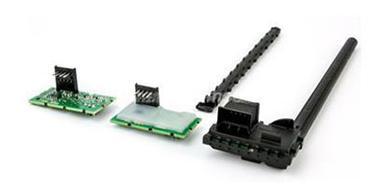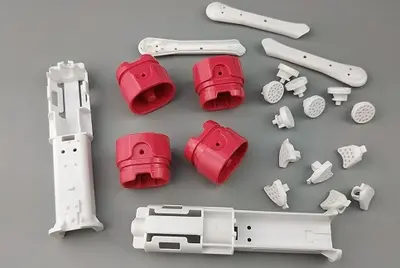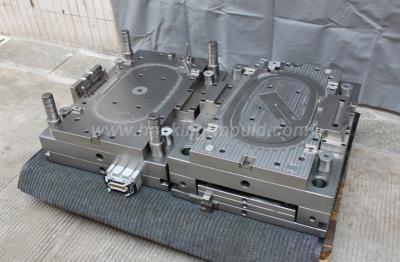

The main ingredient of plastic raw materials is polymer matrix, which is called resin.
Plastic resin is made of high molecular synthetic resin (polymer) as the main ingredients, with various auxiliary materials or some additives with specific purposes added. They have plasticity and fluidity under specific temperature and pressure, can be molded into a certain shape, and remain unchanged under certain conditions.
Polymer refers to the pure material or polymeric material produced in the polymerization process. Both natural resin and synthetic resin are polymer.
a. Plastic resins expand when heated, and the coefficient of thermal expansion is larger than that of metal;
b. Generally, the rigidity of plastic materials is lower than that of metal;
c. The mechanical properties of plastic resins will decline significantly after being heated for a long time;
d. Generally, plastic resins will experience permanent deformation under long-term stress under normal temperature and stress lower than their yield strength;
e. Plastic materials are very sensitive to notch damage;
f. The mechanical properties of plastic materials are usually much lower than those of metals
g. Some plastics are combustible;
h. Some plastic materials will absorb moisture and cause dimensional and performance changes;
Thermoset plastics will combine the molecular structure into a network shape after heating. Once combined into a network polymer, it will not soften even if reheated. It shows the so-called [irreversible change], which is caused by the change of molecular structure (chemical change).
Thermo plastics will melt after heating, can flow to the mold for cooling and forming, and will melt again after reheating. They can be heated and cooled to produce [reversible change] (liquid ←→ solid), which is a physical change.
Generally speaking, thermoplastic is used for injection molding, thermoplastic including but not limited to polyethylene, polypropylene, polyvinyl chloride, polystyrene, polyformaldehyde, polycarbonate, polyamide, acrylic plastics, other polyolefins and their copolymers, polysulfone, polyphenyl ether.
PP (Polypropylene)

PP is a polymer formed from propylene through addition polymerization, odorless, tasteless and non-toxic. PP is the lightest resin in common use. PP has excellent mechanical properties, good heat resistance, continuous use temperature of 110-120 ℃, and good chemical stability, excellent electrical performance, high frequency resistant electrical insulation, and good electrical insulation in humid environment, the most important PP is low price;
Applications of PP in injection molding parts:
Automobiles parts (Bumper, anti chafing strip, automobile steering wheel, instrument panel and interior trim)
Electrical appliances (Motor fan, Washing machine, Water heater shell, Shell and base of rice cooker)
Containers, Cups, Bottles
Furniture plastic parts (Storage rack, table, stool)
Medical equipment (Infusion tube, infusion valve, syringe, blood dialyzer, hospital bed guardrail)
Packaging materials
ABS (Acrylonitrile butadiene styrene copolymer)
.jpg)
ABS is a thermoplastic polymer material with high strength, good toughness and easy processing, A represents acrylonitrile, B means butadiene, and S is styrene. ABS can perform normally under the environment of - 25 ℃~60 ℃, and has good formability. The processed product has a smooth surface and is easy to dye and electroplating. And it can be mixed with a variety of resins to form blends.
Is ABS toxic? ABS is relatively harmless because it has no known carcinogens and no known adverse health effects related to ABS exposure.
ABS is characterized by high strength and low weight. It is opaque, light ivory, non-toxic, tasteless, and has the characteristics of toughness, hardness, and rigidity. It burns slowly, the flame is yellow, and there is black smoke. After burning, the plastic softens and burns, giving off a special smell of cinnamon, but there is no melting and dripping. It is a commonly used engineering plastic. Molding shrinkage: 0.4-0.7%, molding temperature: 200-240 ℃, drying condition: 80-90 ℃/2h.
ABS is widely used in electric and electronic industry, compare to PP material, ABS is not easy to scratch, and ABS plastic parts have more pleasing appearance than PP products.
flame retardant and high heat resistance ABS is a very plastic injection molding material for electrical products, include consumer electrical, office appliance and home appliance products. In recently years, ABS is also to be used for many automotive components, such as some interior and exterior plastic housing, steering wheel, oil guide pipe, handle, front radiator grille and lampshade, etc. It can save time and cost to produce these car parts via injection molding mass production.
In HanKing Mould, we use ABS to produce plastic parts for our customers every day, our injection molding technician is expert to know how to get perfect ABS plastic injection molding parts.
PC (Polycarbonate)
.jpg)
PC, also known as polycarbonate, is also a common plastic material in injection molding products
Polycarbonate resin has many excellent properties, such as high impact resistance, high transparency, wide temperature range (- 40 to 160 ℃), dimensional stability, processing performance, flame retardance, insulation, etc. PC can be seen everywhere in life. It has provided great convenience for our life and greatly improved our living standard.
Polycarbonate materials are widely used, not only in glass assembly industry, automobile industry, electronics and electrical industry, but also in medical and health care, film, leisure and protective equipment.
PC resin can be used to produce automobile lighting system, instrument panel system and interior decoration system, as front lamp shade, front and rear fender with reinforcing rib, and reflector frame.
Polycarbonate is a very good insulating material, which can adapt to a wide range of temperature and humidity. The flame retardancy and dimensional stability of polycarbonate further promote its application in the electronic and electrical industry. Operating rod sheath, choke plate, junction box, socket, plug and sleeve, gasket, TV conversion device, communication cable connector under telephone line bracket, switch box, telephone switchboard, distribution panel element, relay, also have excellent application in important parts of computer, video recorder and color TV.
POM (Polyoxymethylene)
.jpg)
Polyoxymethylene (POM), general engineering plastic, also known as acetal resin, is a thermoplastic crystalline polymer, known as "steel similar", it can be seen that the most obvious characteristic of POM must be good hardness performance, because of this feature, POM is widely used as a substitute for metal.
Common properties of POM: high crystallinity, high rigidity, strength, self-lubrication, fatigue strength, chemical resistance, creep resistance, low water absorption, dimensional stability.
POM has the advantages of self-lubrication, oil resistance and good balance of mechanical properties, which enables POM to replace the mechanical parts such as gears, screws, bearings and other metal materials in the past. Moreover, it has been widely used in our daily life, such as buttons, zippers, toothbrush handles, etc. Many automotive products are also produced via injection molding machine with POM material, such as car locks, latches, safety belt buckles and other safety parts, fuel system components, etc.
POM is a material with excellent electrical insulation performance, and its volume resistivity is 1 × 1014 Ω. cm, surface resistivity is 1 × 1016 Ω. cm, electrical strength>30MV/m, easy to be modified into conductive and anti-static materials, modified volume resistivity is 1x10 Ω. cm, with good conductivity.
Fire resistance of POM: its oxygen index (LOI) is 15%, which is easy to burn, so it is difficult to reach the fire resistance grade of UL94V-0.
PA (Polyamide, commonly known as nylon)
.jpg)
PA has good comprehensive properties, including mechanical properties, heat resistance, abrasion resistance, chemical resistance and self-lubrication, low friction coefficient, certain flame retardancy, easy processing, suitable for filling with glass fiber and other fillers to enhance the modification, improve the performance and expand the scope of application. There are many kinds of PA, commonly used in plastic injection molding industry are PA6, PA66, PA12, and many new varieties of semi-aromatic nylon PA6T and special nylon developed in recent years.
PA plastic is widely used in the automotive industry: cooling water chamber, intake manifold, mirror frame bracket, ventilation grille, door handle, throttle valve body, fan cover, variable speed control lever cover, handbrake, accelerator pedal, gear, etc. Special materials for automobiles have the characteristics of high rigidity, long-term thermal stability, lightweight, good welding performance, high bursting strength, low noise and oil resistance, and are applied to intake manifolds, etc.
In the field of sports equipment, it is applied to ski equipment, baby carriages, bicycles, fitness equipment parts, etc. The materials have the characteristics of high rigidity, high impact strength, good appearance, good coloration, and low temperature resistance, and are applied to scooters, fitness bicycles, etc. In the field of home decoration, it is applied to: seat bracket, pulley, rotary shaft, paper shredder gear, printer parts, etc. It has high rigidity, good low-temperature resistance, good weather resistance, good coloring performance, good surface appearance, and cost effective.
In HanKing Mould, we have injection molded many different kinds of PA plastic products for our customers, such as electrical engineering products, industrial switchgear, switch box, generator brush holder, plug connector in photovoltaic system, junction box, charging socket, terminal base, circuit breakers for electrical systems, high-load industrial components, such as bearings and gears, as well as electrical insulation components such as terminal blocks and cable connectors.
TPE (Thermoplastic elastomer)
.jpg)
TPE material is a kind of polymer material with both plastic and rubber properties, which shows high elasticity of rubber at room temperature and can be plasticized at high temperature.
TPE is generally used for products that need to be wrapped injection molding, which we call it over molding.
In Hanking Mould, our most frequently produced TPE over molding products are electrical accessories, TPE over molding plastic housing, cover, these housing has waterproof function normally.
PC/ABS (Polycarbonate & ABS)
.jpg)
PC/ABS is also our common plastic injection molding material. It is obvious from the name that PC/ABS is a thermoplastic plastic formed by the combination of polycarbonate and acrylonitrile-butadiene-styrene copolymer (ABS), which combines the excellent properties of the two materials. For example, the ease of processing of ABS and the excellent mechanical properties and thermal stability of PC. It can be widely used in automobile internal parts, business machines, communication equipment, household appliances and lighting equipment.
PC/ABS material application field
1. Car interior and exterior decoration: instrument panel, trim pillar, instrument front cover, grille, interior and exterior decoration;
2. Business equipment shell and built-in parts: notebook/desktop computer, copier, printer, plotter, display;
3. Telecom, mobile phone shell, accessories and smart card (SIM card);
4. Electrical products, electronic product housing, meter cover and housing, household switch, plug and socket, cable and conduit;
5. Household appliances, such as washing machine, hair dryer, internal and external parts of microwave oven, etc.
Injection molding process conditions for PC/ABS: drying treatment before processing is necessary.
The humidity should be less than 0.04%, and the recommended drying condition is 90~110 ℃ for 2~4 hours. Melting temperature: 230~300 ℃.
Mold temperature: 50~100 ℃.
Injection pressure: depends on the plastic part.
Injection speed: as high as possible.
As a professional China plastic mold factory, we can produce more than plastic parts of the above materials for customers, in past ten years, HanKing Mould also produced plastic products with PBT, PPS, PEEK, PPA, ASA, SAN, PTFE, PE, HDPE, PPE, PPO., etc. If you have similar plastic products need to be injection molding, please contact us, our professional engineer team will work with you together.






 Call us on:
Call us on:  Email Us:
Email Us:  No.23, XingYi Road, Wusha Community, Chang'an Town, Dongguan City, Guangdong Province, China.
No.23, XingYi Road, Wusha Community, Chang'an Town, Dongguan City, Guangdong Province, China.